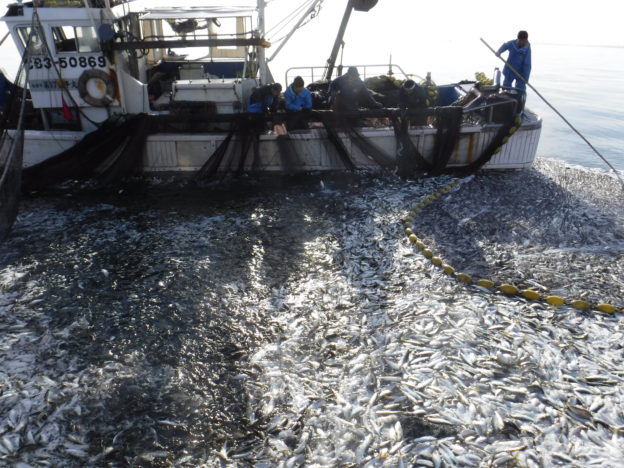Following the last blog post’s discussion of the overconsumption of food, one adjacent issue that arises is overfishing. This is one of the many problems of overconsumption that has grown to concerning heights in recent years. Simply put, overfishing is removing sea life from the ocean at a rate that is faster than the rate at which fish can reproduce and make up for the loss. This leads to a rapid decrease in the population of wildlife in the sea and only continues to drop as the seafood industry grows.

The biggest cause of this overconsumption is through illegal fishing practices. The most damaging of these practices being bottom trawling. This is when industrial nets are weighted to the ocean floor, then dragged against the terrain to grab mass amounts of fish. This is pictured in action in the image to the right. This method collects various types of sea life, including rare or endangered species. To worsen the matter, the majority– 80-90%– of fish that are discarded back into the ocean from the boats are dead before they reach the water. This also poses a threat to the coral reefs and ocean floor, as the heavy nets compress the homes of the sea life and render them unlivable. For additional information, the National Ocean Service goes deeper into the consequences the coral reef face as a result of bottom trawling.
 The World Counts Organization has significant research that shows the ocean could be left almost entirely wiped of fish by 2048. That is just under 25 years. While today’s fishing practices make it possible to fuel the worlds need for protein and food, this will soon not be a feasible option if practices are not better regulated. One possible way to counteract these consequences is to ban fishing subsidies. The allowance for fishing gear and tools adds unnecessary incentive for unethical fishing practices, as well as encouraging bottom trawling. One way to lessen the impact of this trawling is to create more aggressive fishing net regulations. As detailed in Earth.Orgs solutions to overfishing, placing limitations on the depth of the nets in the ocean by only two meters makes a serious change in the amount of endangered wildlife that is unnecessarily killed. In places like the Indian Ocean, this could lessen sea life deaths by over 90%.
The World Counts Organization has significant research that shows the ocean could be left almost entirely wiped of fish by 2048. That is just under 25 years. While today’s fishing practices make it possible to fuel the worlds need for protein and food, this will soon not be a feasible option if practices are not better regulated. One possible way to counteract these consequences is to ban fishing subsidies. The allowance for fishing gear and tools adds unnecessary incentive for unethical fishing practices, as well as encouraging bottom trawling. One way to lessen the impact of this trawling is to create more aggressive fishing net regulations. As detailed in Earth.Orgs solutions to overfishing, placing limitations on the depth of the nets in the ocean by only two meters makes a serious change in the amount of endangered wildlife that is unnecessarily killed. In places like the Indian Ocean, this could lessen sea life deaths by over 90%.
Overarchingly, overfishing is growing to a level that is quickly becoming uncontrollable. With no time to spare, it is ever-so important that society takes the obligatory steps to decrease the global overfishing problem.
I really did not know that overfishing was such a big issue at the moment. I can’t believe that fish could be almost completely out of the ocean by 2048… that’s a terrifying statistic. I guess I was more aware of the scarcity of other sea creatures, such as crab or lobster. I never would think of fish as being at risk because that’s the first thing I, and I’m sure many people, think of when thinking about what lives in the ocean. I hope that bottom trawling is able to be better regulated so we can help save fish populations.
This was a great post! I have heard about overfishing a little knew that it was a big problem but not this big. The statistics showing that the ocean could be wiped of fish as early as 2048 is honestly pretty terrifying. Net regulations seem like a good way to combat this problem for big corporations. Is there anything the general population can do to help outside of protesting?
One of the largest issues with regulating overfishing is that it is incredibly difficult to designate marine environments as federally protected areas. Unlike terrestrial National Parks with concrete borders and 2D surfaces, ocean environments have depth to them and are constantly in motion, not to mention the organisms that inhabit them are also constantly moving. Water in general is all connected on this planet, which leads us to ask how we go about protecting it when there is no possible way to protect the whole hydrosphere. I like that you brought attention to this issue because after reading the other comments, I didn’t realize that so many people were unaware of the consequences and frequency of overfishing throughout the world. Good job with this post!
You did a really good job of explaining what overfishing was, especially due to the fact that you both named the issues and provided solutions to these issues. It always makes me so sad to hear humans destroying the habitats of animals just because there’s money involved. I actually hate how much of a play money has in everything. I’m curious if you know any ways that we can know if the fish that we buy at the store has been collected ethically and legally. I wouldn’t want to unintentionally support illegal and unethical fishing practices. Thank you for bringing awareness to this issue. I also think the images that you used spoke volumes, especially the last one with all of the collected fish.